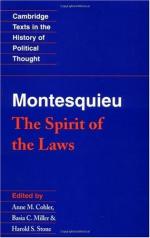|
This section contains 9,769 words (approx. 33 pages at 300 words per page) |

|
SOURCE: Hundert, E. J., and Paul Nelles. “Liberty and Theatrical Space in Montesquieu's Political Theory: The Poetics of Public Life in the Persian Letters,” Political Theory 17, 2 (1989): 223-46.
In this essay, Hundert and Nelles support the argument advanced by Judith Shklar that Montesquieu describes liberty as requiring a theatrical public sphere, adding that the Persian Letters reflect Montesquieu's earlier explorations of this idea. The authors focus on the structure and genre of the novel to demonstrate how Montesquieu uses the unusual form of the epistolary novel to advance his political philosophy.
“The crowns and scepters of stage emperors,” remarked Sancho, “were never known to be of pure gold; they are always of tinsel or tinplate.”
“That is the truth,” said Don Quixote, “for it is only right that the accessories of a drama should be fictitious and not real, like the play itself. Speaking of that, Sancho, I would...
|
This section contains 9,769 words (approx. 33 pages at 300 words per page) |

|


